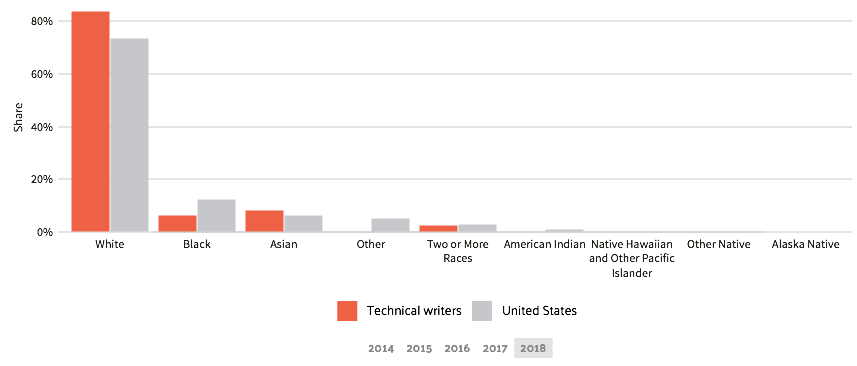Tracey Saloman
Identifying & Addressing Racism in Technical Communication
This graph from DataUsa.io’s Technical Writers profile page depicts the racial breakdown of the technical writing field in the United States based off results from the 2010 U.S. Census results. It illustrates over 80% of reported technical writers are White, and less than 10% respectively are Black and Asian.
https://datausa.io/profile/soc/technical-writers#demographics
What question or problem did you examine, and why?
The problem I researched was the diversity, or lack thereof, of the professional writing and communications field. I focused more specifically on technical and professional writing programs within colleges and universities, looking at students, faculty, and curricula. I selected this particular issue because of a noticeable imbalance of white participants and pretty much any other ethnicity. Employment statistics reported a reflection of this imbalance in the previous U.S. Census. Over the last five years, I have become a passionate advocate for increasing opportunities and accessibility to underrepresented groups, more specifically youth. There is a distinct lack of participation of minorities or non-whites in TPC programs in both students and a noticeable absence of diversity in programs textbooks, possibly other curriculum materials as well. Another problem is the lack of awareness or unwillingness to discuss race and ethnicity within the fields and programs.
I chose this topic because I have two non-white adopted children, and I have learned through experience that many things will be more challenging for them because of this. I believe that non-white groups in the United States have a more difficult time accessing information about programs like technical and professional communications due to established racist narratives. I wanted to investigate what conversations are happening around this topic and what steps are being taken to identify and improve the situation, making this field more accessible to all types of people.
What excited you most about your research?
What excited me most about my research was the significant increase in the discussion and investigation into this issue within the last two decades. Although there was some scholarship prior, in the 1990s, there was not an open acceptance of this being an actual issue that limits the potential of the field. I felt that many of my observations and ideas were validated in research that I read, and I felt that many of the qualitative studies done through student and faculty surveys demonstrated a strong need to address the implicit racism and lack of diversity in colleges. I also believe the information I found supports continued systemic oppression, of blacks, indigenous peoples, and other immigrant populations due to a lack of awareness and an established “white” narrative.
How does this research reinforce or change your work as a professional?
I have always liked the editing and proof-reading fields, as well as creating content to meet the needs of a client. I like to think of myself as the idea conduit. Someone has an idea, and I can take those ideas and produce a document of some sort to organize and share those ideas. I like to make writing better, clearer, more interesting, and more relatable. After completing my studies this year and writing my research paper, I have a new focus for using my previous interests: to increase accessibility in technical and professional documents for more racially, ethnically, and culturally diverse audiences.
I feel this focus will capture the interests of organizations who claim to be diverse or work for diverse populations, but do not really understand what makes writing accessible to specific audiences. I believe that as I gain a wider understanding of the cultural evolution of professional communications, I will be able to improve my editing skills to incorporate this understanding.

